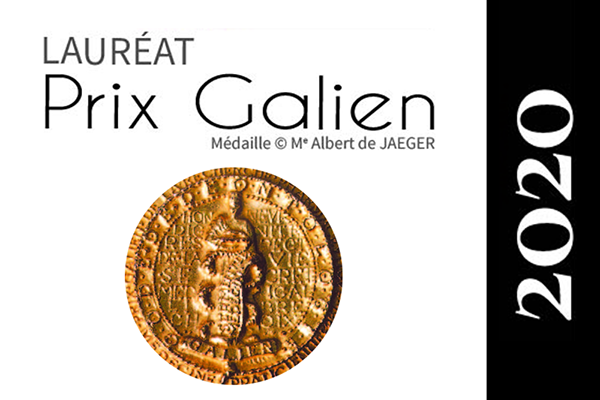News

Martine Bagot and Armand Bensussan are rewarded for their research and receive the Galien Prize 2020 on the 18th of December
Professor Martine Bagot* and Professor Armand Bensussan** are rewarded for their research on the development of a targeted therapy, lacutamab, a first-generation immunotherapy targeting the tumor antigen KIR3DL2, to treat, prolong survival and improve the quality of life of patients with advanced, refractory and relapsed T cell lymphomas, particularly erythrodermic cutaneous T cell lymphomas. The Galien Prize here rewards two decades of research.
SUCCESSFUL TRANSLATIONAL RESEARCH
The approach of their research is extremely original since it is based on a collaboration involving hospital-university and INSERM teams who have developed a recognized expertise in the field of cutaneous T-cell lymphomas (CTCL). This collaboration led to the identification of a diagnostic and prognostic marker of CTCL, the tumor antigen KIR3DL2. This translational research was then followed by a collaboration with Innate Pharma, a biotechnology company that led to the development of a humanized monoclonal antibody, lacutamab, which specifically binds the molecule KIR3DL2, a protein expressed by tumor cells and allowing the recruitment of NK lymphocyte-mediated antibody-dependant cell-mediated cytotoxicity. The initial results of this collaboration confirmed the relevance of this unique therapeutic strategy, recognized internationally as a major breakthrough in the treatment of serious orphan diseases with high medical need including Sézary syndrome.
CONTEXT
The heterogeneity and scarcity of CTCL (approximately 0.6 new cases/100,000 people/year) have historically been significant barriers to the development of targeted, effective and well-tolerated therapies, as have patients with B-cell non-Hodgkin lymphoma. CTL are orphan diseases for which there are currently no curative treatments and very few treatments with MMA. Today’s awarded work opens up new perspectives for erythrodermic cutaneous T-cell lymphomas (ECTCL).
Sézary syndrome is a subtype of primary CTCL, clinically characterized by erythrodermia (chronic erythema of the entire skin associated with permanent and disabling pruritus) and, biologically, by skin infiltration, blood invasion and lymph nodes by malignant lymphocytes (Sézary cells). These lymphomas are rare. Patients have no chance of recovery after two systemic treatment lines: the median life expectancy of advanced patients does not exceed 5 years and their quality of life is dramatically affected.
A DRUG IN PROGRESS
The Phase I international clinical trial led by Pr. Martine Bagot evaluated lacutamab, a first-generation immunotherapy targeting the tumor antigen KIR3DL2, in 44 patients with advanced and relapsed CTCL, which were heavily pretreated.
Of the 35 patients with Sézary syndrome, 15 (43%) presented a comprehensive clinical response and these responses lasted (median) 13.8 months. Two patients (6%) even showed lasting complete remission, i.e. the total disappearance of clinical signs in the skin, blood and lymph nodes. The median progression-free survival of 35 patients with Sézary syndrome was almost 1 year old.
In addition, the majority of patients reported a significant improvement in their quality of life during treatment with lacutamab, with a drastic decrease in their generalized pruritus, even in those whose disease had remained clinically stable. The decrease in KIR3DL2 staining after 5 weeks of treatment appears to be a predictor of overall clinical response.
Lacutamab allows selective destruction of tumor cells in the skin, blood and lymph nodes while respecting the immune system of patients, unlike most other treatments.
Lacutamab has thus obtained orphan drug status for the treatment of patients with CTCL recognized by the FDA (Food and Drug Administration) and the EMA (European Medicines Agency), confirming that it meets a significant public health need for the treatment of a low-prevalence disease. It has been designated by the FDA as a “Fast Track Medicine” allowing for facilitated regulatory interactions to accelerate its development and obtaining its marketing authorization (MMA).
THE FUTURE
- The good safety profile of lacutamab observed makes it possible to consider offering it to patients at less advanced stages of the disease: in particular, several studies suggest that KIR3DL2 would be a marker of poor prognosis for CTCL, which reinforces the rational to use it earlier in the natural history of these diseases, in patients whose tumor cells express it.
- The detection of KIR3DL2 could help improve the diagnosis of these diseases.
- Based on all the data from the phase I trial, a phase II clinical trial was designed with the objective of confirming the efficacy of lacutamab in relapsing Sézary syndrome, with a view to requesting accelerated Marketing Authorization within 2 years only, for this rare disease with strong medical need.
- It will be interesting in the future to study the effect of lacutamab in several types of T lymphomas (peripheral T lymphomas, lymphomas associated with the HTLV-1 virus, LGL leukemias, eosinophilic lymphoid syndromes, etc.), in order to extend the field of its therapeutic applications. The current phase 2 study includes only mycosis fungoides, Sézary syndrome and peripheral T lymphomas.
*Martine Bagot, PU-PH, chef de service, dermatologie
**Armand Bensussan, directeur de recherche Inserm, directeur de l’unité Inserm UMR_S 976
Hôpital Saint-Louis
REFERENCES
- Bagot M, Porcu P, Cardine AM et al. IPH4102, a first-in-class anti-KIR3DL2 monoclonal antibody, in patients with relapsed or refractory cutaneous T-cell lymphoma: an international, first-in-human, open-label, phase 1 trial. Lancet Oncol. 2019;20(8):1160-70.
- Roelens M, de Masson A, Ram-Wolff C et al. Revisiting the initial diagnosis and blood staging of mycosis fungoides and Sézary syndrome with the KIR3DL2 marker. Br J Dermatol. 2020;182(6):1415-22.
- Hurabielle C, Leboeuf C, Ram-Wolff C et al. KIR3DL2 expression in patients with adult T-cell lymphoma/leukaemia. Br J Dermatol. 2018;179(1):197-199.
- Van Der Weyden C, Bagot M, Neeson P, Darcy PK, Prince HM. IPH4102, a monoclonal antibody directed against the immune receptor molecule KIR3DL2, for the treatment of cutaneous T-cell lymphoma. Expert Opin Investig Drugs. 2018;27(8):691-7.
To learn more, click here


